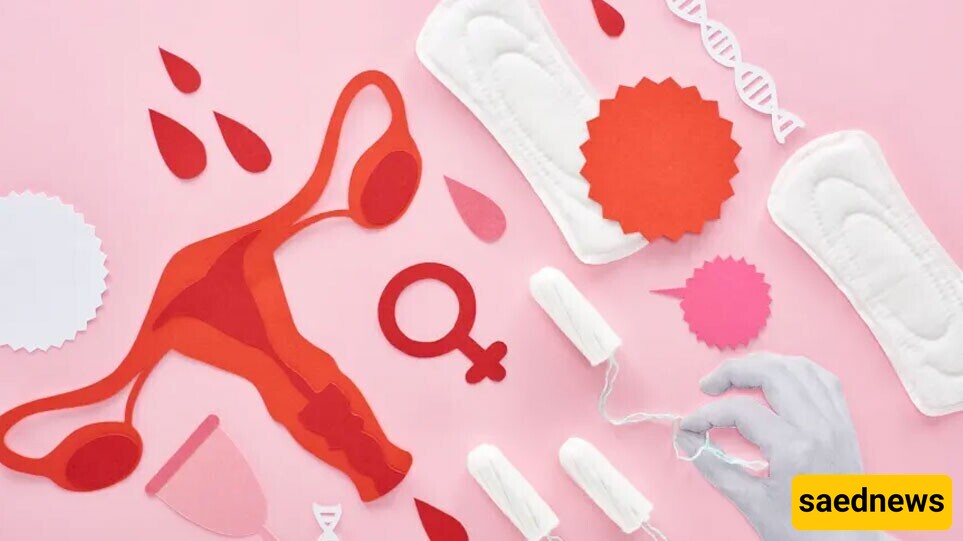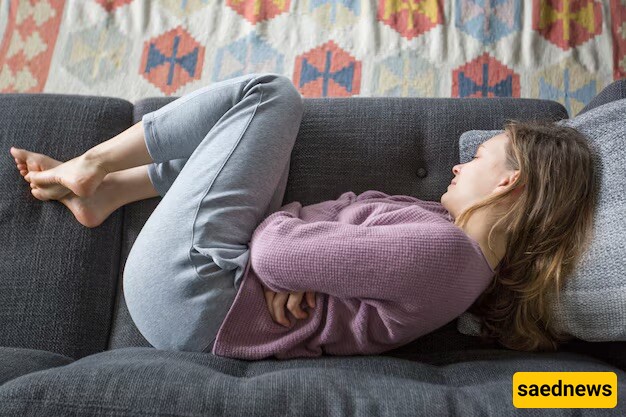Menstrual pain is one of the primary symptoms of menstruation, starting a few days before the period and intensifying during the days of bleeding. Most women experience this pain, but its severity and duration vary for each individual. Typically, menstrual pain is most intense during the first 48 to 72 hours of menstruation.

According to the family magazine service of Saed News, menstrual pain, or dysmenorrhea, is caused by uterine contractions and the breakdown of the uterine lining during the menstrual cycle. These contractions compress the blood vessels in the uterine wall, reducing blood and oxygen supply to the uterus. The lack of oxygen causes the uterus to release chemicals that lead to menstrual cramps.
The exact reason why some women experience severe menstrual pain isn't fully understood. Researchers believe that higher levels of prostaglandins, which cause menstrual pain, are released in some women, leading to more intense pain. In most women, the severity of menstrual pain decreases after pregnancy or with age.
Causes of Menstrual Pain
Experiencing mild to severe menstrual pain in the first three days of your period is normal. However, if this pain persists throughout the menstrual cycle and hinders daily activities, a gynecologist should evaluate it.
Other types of menstrual pain can stem from certain gynecological conditions that will persist until treated. Some common causes of menstrual pain related to uterine and pelvic diseases include:
Uterine Fibroids: Benign tumors in the uterine wall.
Ovarian Cysts: Small, low-risk cysts in the ovaries.
Pelvic Inflammatory Disease (PID): Infection of the uterus and ovaries.
Endometriosis: Growth of the uterine lining in the fallopian tubes or ovaries.
Adenomyosis: Growth of the endometrium in the muscular wall of the uterus.
Cervical Stenosis: Narrowing of the cervix, causing issues during menstrual bleeding.
Best Home Remedies for Menstrual Pain
Mild to moderate menstrual pain can often be alleviated with home remedies or over-the-counter pain relievers. However, if the pain is severe, consulting a gynecologist is necessary. Here are some home remedies to reduce natural menstrual cramps:
Avoid caffeine, fatty foods, very sweet, and salty foods.
Place a warm water bag on your abdomen and lower back to relieve menstrual pain quickly.
Get plenty of rest and sleep.
Completely avoid alcohol and tobacco.
Engage in regular physical activity and stretching exercises.
Massage the abdomen and lower back to reduce contractions.
Avoid stressful situations as much as possible (techniques like deep breathing, yoga, and meditation can help manage stress).
Medical Treatment for Menstrual Pain
The best medical treatments for menstrual pain include:
Ibuprofen
Naproxen
Gelofen
Supplements like Vitamin D, Vitamin E, Magnesium, and Omega 3
What to Eat for Menstrual Pain?
Certain foods can help reduce menstrual pain, including:
Ginger
Cinnamon
Turmeric
Sesame seeds
Almonds and walnuts
Spinach
Parsley
Plenty of fluids
Dark chocolate
Bananas


